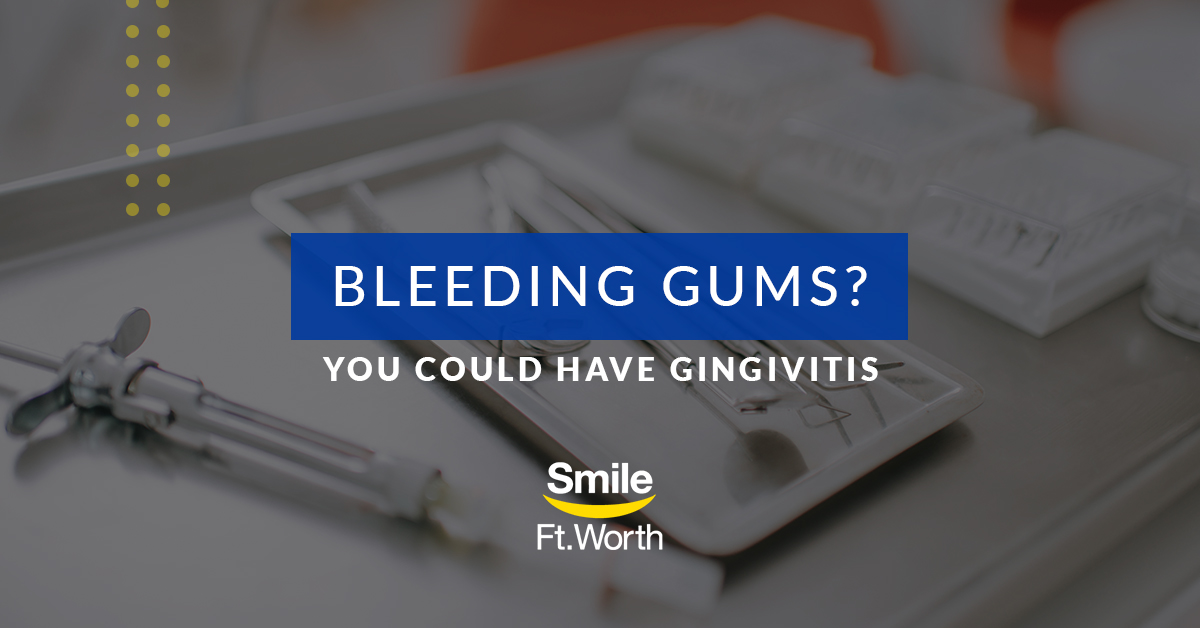What are your gums trying to tell you?
At Smile Fort Worth, we don’t only protect teeth, but the gums, too. Healthy gums are critical for a healthy mouth; they keep your teeth firmly anchored in place. Yet, bad oral hygiene — which causes cavities and tartar buildup on your teeth’s surfaces — can also lead to receding, inflamed gums. This is commonly called gingivitis and is the first stage of gum disease.
Do you have any of these symptoms? You may have gingivitis.
- The presence of blood when brushing or flossing
- Swollen, tender gums
- Receding gumline
- Bad breath
If you have one or more symptoms of gingivitis, schedule an appointment with a Smile Fort Worth dentist right away. The best way to treat gingivitis is to get ahead of it and take action as soon as you start to notice symptoms. Drs. Harlin, Wilkinson, and Collins have years of experience diagnosing and treating gingivitis. And, with anesthetics and sedatives, we can make sure the process is as comfortable and stress-free as possible.
What causes gingivitis?
Gingivitis is the first stage of gum disease, or periodontitis — a condition that can ultimately lead to loose teeth, bone decay, and loss of teeth.
Gingivitis is caused when plaque along the gumline isn’t effectively removed (either through daily brushing or regular dental cleanings) and it hardens into tartar. This buildup plays host to harmful oral bacteria. Over time, this bacteria damages healthy gum and tooth tissue and breaks down your gums’ connection to teeth. Sore, tender gums and loose-feeling teeth are sure signs your gums are under distress.
Gingivitis is the first stage of gum disease, or periodontitis — a condition that can ultimately lead to loose teeth, bone decay, and loss of teeth.
Who’s at risk?
Gingivitis can affect anyone. But certain factors can predispose certain members of the population to be more susceptible to contracting gingivitis. Some of these risk factors include:
- History of smoking or chewing tobacco
- Old age
- Poor dental habits
- Poor nutrition, specifically a deficiency of
- Vitamin C
- Dry mouth
- History of family members with gingivitis
Don’t have these symptoms? Let’s keep it that way.
If you have one or more risk factors for gingivitis, it’s especially important to take extra precautions to ensure your oral health. Be sure you’re following these daily habits:
- Brush your teeth twice a day (for at least 2 minutes)
- Floss at least once a day
- Drink a glass of water after meals and snacks to lessen plaque buildup
- Avoid a diet high in simple carbohydrates and sugars
Regular dental visits are also crucial for preventing gingivitis. Our Smile Fort Worth dentists can look for early signs of gingivitis when you come in for dental cleanings twice a year. And our friendly dental hygienists can clean away pesky plaque and tartar that can inflame your gums over time.
Don’t wait too long! Treatment becomes more invasive the longer you put off gum disease.
Luckily, when caught in its earliest stages, gingivitis can be treated quickly and the effects of the damage can often be reversed. However, if you let gum disease progress, the options for treatment become more involved.
The method for treating advanced gum disease is called scaling and root planing. This procedure involves removing plaque and tartar from beneath the gumline, and then smoothing out the root of the tooth to help it reattach to the gums. The procedure may require a local anesthetic and could require multiple dentist visits to complete.
This procedure is necessary when deep pockets form in the gums, and plaque grows in these pockets that can’t be reached with just a toothbrush. Staying up-to-date with your regular dental cleanings at Smile Fort Worth can help you avoid this procedure!
Pay Attention to What Your Gums Are Telling You.
Plan Your Next Visit to Our Office.







Recent Comments